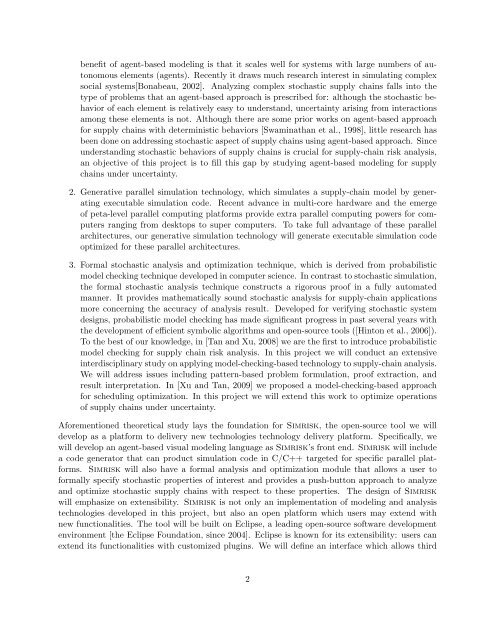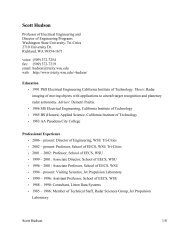SimRisk: An Integrated Open-Source Tool for Agent-Based ...
SimRisk: An Integrated Open-Source Tool for Agent-Based ...
SimRisk: An Integrated Open-Source Tool for Agent-Based ...
Create successful ePaper yourself
Turn your PDF publications into a flip-book with our unique Google optimized e-Paper software.
enefit of agent-based modeling is that it scales well <strong>for</strong> systems with large numbers of autonomous<br />
elements (agents). Recently it draws much research interest in simulating complex<br />
social systems[Bonabeau, 2002]. <strong>An</strong>alyzing complex stochastic supply chains falls into the<br />
type of problems that an agent-based approach is prescribed <strong>for</strong>: although the stochastic behavior<br />
of each element is relatively easy to understand, uncertainty arising from interactions<br />
among these elements is not. Although there are some prior works on agent-based approach<br />
<strong>for</strong> supply chains with deterministic behaviors [Swaminathan et al., 1998], little research has<br />
been done on addressing stochastic aspect of supply chains using agent-based approach. Since<br />
understanding stochastic behaviors of supply chains is crucial <strong>for</strong> supply-chain risk analysis,<br />
an objective of this project is to fill this gap by studying agent-based modeling <strong>for</strong> supply<br />
chains under uncertainty.<br />
2. Generative parallel simulation technology, which simulates a supply-chain model by generating<br />
executable simulation code. Recent advance in multi-core hardware and the emerge<br />
of peta-level parallel computing plat<strong>for</strong>ms provide extra parallel computing powers <strong>for</strong> computers<br />
ranging from desktops to super computers. To take full advantage of these parallel<br />
architectures, our generative simulation technology will generate executable simulation code<br />
optimized <strong>for</strong> these parallel architectures.<br />
3. Formal stochastic analysis and optimization technique, which is derived from probabilistic<br />
model checking technique developed in computer science. In contrast to stochastic simulation,<br />
the <strong>for</strong>mal stochastic analysis technique constructs a rigorous proof in a fully automated<br />
manner. It provides mathematically sound stochastic analysis <strong>for</strong> supply-chain applications<br />
more concerning the accuracy of analysis result. Developed <strong>for</strong> verifying stochastic system<br />
designs, probabilistic model checking has made significant progress in past several years with<br />
the development of efficient symbolic algorithms and open-source tools ([Hinton et al., 2006]).<br />
To the best of our knowledge, in [Tan and Xu, 2008] we are the first to introduce probabilistic<br />
model checking <strong>for</strong> supply chain risk analysis. In this project we will conduct an extensive<br />
interdisciplinary study on applying model-checking-based technology to supply-chain analysis.<br />
We will address issues including pattern-based problem <strong>for</strong>mulation, proof extraction, and<br />
result interpretation. In [Xu and Tan, 2009] we proposed a model-checking-based approach<br />
<strong>for</strong> scheduling optimization. In this project we will extend this work to optimize operations<br />
of supply chains under uncertainty.<br />
A<strong>for</strong>ementioned theoretical study lays the foundation <strong>for</strong> Simrisk, the open-source tool we will<br />
develop as a plat<strong>for</strong>m to delivery new technologies technology delivery plat<strong>for</strong>m. Specifically, we<br />
will develop an agent-based visual modeling language as Simrisk’s front end. Simrisk will include<br />
a code generator that can product simulation code in C/C++ targeted <strong>for</strong> specific parallel plat<strong>for</strong>ms.<br />
Simrisk will also have a <strong>for</strong>mal analysis and optimization module that allows a user to<br />
<strong>for</strong>mally specify stochastic properties of interest and provides a push-button approach to analyze<br />
and optimize stochastic supply chains with respect to these properties. The design of Simrisk<br />
will emphasize on extensibility. Simrisk is not only an implementation of modeling and analysis<br />
technologies developed in this project, but also an open plat<strong>for</strong>m which users may extend with<br />
new functionalities. The tool will be built on Eclipse, a leading open-source software development<br />
environment [the Eclipse Foundation, since 2004]. Eclipse is known <strong>for</strong> its extensibility: users can<br />
extend its functionalities with customized plugins. We will define an interface which allows third<br />
2




